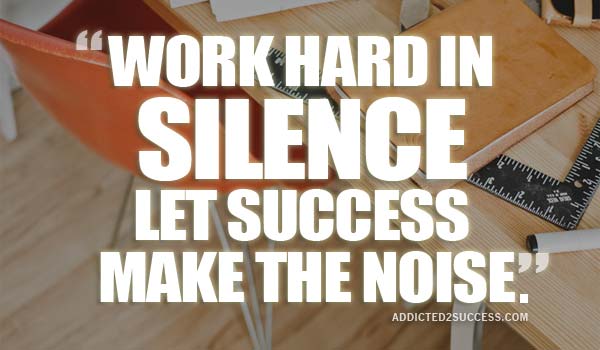Success Advice
7 Qualities Of The Highly Successful
What separates the highly successful from those who are “just getting by“?
This is a question that a lot of aspiring entrepreneurs have when they are just starting out. You have read all the books and learned all the skills but your mindset and “know how” may not be quite there yet.
Here is a list of the 7 qualities that the highly successful live by.
1. They Are Actors On The Pitch Of Life, Not Spectators
The vast majority of people live in Dreamland where they wish, hope and pray that things will turn around in their favor, the highly successful are those who get up and take action! They never wait for a more favorable condition or time. They simply set out to get things done.
Nolan Bushnell (American engineer and entrepreneur) once said:
“The critical ingredient is getting off your butt and doing something. It’s as simple as that. A lot of people have ideas, but there are few who decide to do something about them now. Not tomorrow. Not next week. But today. The true entrepreneur is a doer, not a dreamer.”
J.K. Rowling worked on her first ever Harry Potter novel when she was a single mother who just lived off welfare. Yet, she didn’t let that deter her. J.K. finished the book and asked publishers all over town to help get the book published. As you would expect, they rejected her and even criticized her harshly because she wasn’t a well-known author yet.
It appeared like nothing was working out for her but she kept at it. She chose to continue and to push through.
In 2014, she became the first ever billionaire author!
2. They Love What They Do
A very remarkable story that reveals this is that of Steve Jobs (American entrepreneur, marketer and inventor as well as the co-founder, chairman and CEO of Apple Inc).
In 1976, when he was 21 years old, he and his friend (Steve Wozniak) started Apple Computers from the Jobs’ family garage. Apple went public on Dec 12, 1980 with a value of 1.2 billion dollars on its first day! In the next few years, Apple suffered significant design flaws that resulted in IBM suddenly surpassing Apple in sales. By 1985, Apple forced Jobs to resign from the company he co-founded!
He picked himself up quickly and started a new hardware and software enterprise he called “Next” To cut the long story short, in 1996, Apple purchased “Next” for $429 Million and eventually hired Jobs as the CEO.
Today, Steve Jobs’ is quoted to have said:
“Sometimes life hits you in the head with a brick. Don’t lose faith. I’m convinced the only thing that kept me going was that I loved what I did. You’ve got to find what you love.”
Yes indeed, you have to discover what you love to do, and be the best at it.
3. They Don’t Stop Until They Get There
I remember hearing the story of Colonel Sanders (founder of KFC) sometime ago. He drove all over America and offered his fried chicken recipe for a certain percentage of the sales. He knocked on several doors, slept in his car and carried on walking around in his white suit even though he already got 1,009 refusals! On the 1,010th time, he finally got a “yes”.
Thomas Edison on the other hand, had his teacher say to him that he was “too stupid to learn anything”, and was fired from his first two jobs for being “non-productive”.
As an inventor, he made 1000 unsuccessful attempts at inventing the light bulb.
When a reporter asked “How did it feel to fail 1000 times?” Edison replied:
“I didn’t fail 1000 times. The light bulb was an invention with 1000 steps.”
Joe Girard said:
“The elevator to success is out of order. You’ll have to use the stairs…. One step at a time.”
Simply put, highly successful people have a different understanding of the word “FAIL”.
To them, to fail just means “First Attempt In Learning”. So every time they seemingly fail, they consider that to be that they have only found one more way that it didn’t work and then they move on.
Walt Disney was fired by a newspaper editor because “he lacked imagination and had no good ideas”.
He went bankrupt several times before he finally built Disneyland. In fact, the proposed park was rejected by the city of Anaheim on grounds that it would only attract riffraff.
Today, the Walt Disney Company has annual revenues of approximately $35 billion!

4. They Focus On Serving Others Rather Than Being Served
Highly successful people know that true success is about serving others with great value rather than living a self-centered life. They know that being selfish, stingy and money driven can help make you money at first but it’s not really a good plan for long-term success. They focus on serving other people and helping them even if it means giving up some of their own resources!
In most cases, successful people define their success on the basis of their positive contributions to others rather than how much money they make. Incidentally, it is practically impossible to really make a remarkable
contribution in the lives of others without making money as well. So the undiscerning are quick to assume that the successful became successful by making more money.
However, it is important to note that it is not that the successful have no care for money. It’s just that money isn’t their focus and priority in life.
5. They Have Clear Cut Visions
A very common factor among the successful is that they all have clarity and certainty about what they want and don’t want out of life. They set SMART (Specific, Measurable, Attainable, Realistic, Time-bound) goals in line with their vision. They have identified their core values (what is important to them) and go all out to live in line with them. They know exactly what they want to achieve and then they chart their course towards it.
Aside from having crystal clear short and long-term goals, the successful also determine exactly what they MUST accomplish each day to bring them closer to their already defined goals. They take full advantage of the “Golden Hour” principle which takes the first hour after you wake up in the morning into consideration. It is assumed that what you do mentally, physically, emotionally, and spiritually during this first hour, sets the tone for the entire day.
6. They Keep Improving Themselves And What They Do
Not a single one of the success stories you would hear of out there started out successful. In fact, for many of them, they were laughed at or even scorned as they began to dream, plan and take the necessary action towards the accomplishment of their set goals. Through thick and thin, they just kept on improving themselves over and over again. It was this self-improvement over time that impacted on the quality of what they did and made them the success that they eventually became.
For instance, did you ever read that Michael Jordan and Bob Cousy were each ousted from their high school basketball teams? How does it feel to know that Michael Jordan who later in his life was addressed as the “Best Player Ever” could not be included amongst the 10-best players in a tiny Laney High School in Wilmington? At the time he was simply not good enough or else, he would have been on the team.
Michael, later in his career, went on to say:
“I’ve missed more than 9000 shots in my career. I’ve lost almost 300 games. 26 times I’ve been trusted to take the game winning shot … and missed. I’ve failed over and over and over again in my life. That is why I succeed.”
No matter what you have decided to do, be sure to see that you are consistently adding to your personal value as well as to the quality of what you do. Strive to see that you never do things of the same quality twice!
Steve Jobs once said:
“Be a yardstick of quality. Some people aren’t used to an environment where excellence is expected.”
Dare to be different.
7. They Understand The Importance Of Discipline
One other quality of highly successful people is that they understand the importance of discipline and self-control. They have come to know that it is not every route that will lead to their desired destination. Hence, they discipline themselves to follow only the route that leads their way. That is why they almost always come across others as mean people!
They constantly work at educating themselves, either formally (academically), informally (watching, listening, asking, and reading) or experientially (doing, trying)… or all three.
This also translates into their ability to maintain their focus on one thing rather than everything. Whereas the ordinary or general public would have long lost focus and concentration on what really matters.
Through discipline, highly successful people know how to pay attention on the one thing that really matters – their goals!
Business
Why Smart Entrepreneurs Are Quietly Buying Gold and Silver
When stocks, property, and cash move together, smart business owners turn to one asset that plays by different rules.

You’ve built your business from the ground up. You know what it takes to create value, manage risk, and grow wealth. But here’s something that might surprise you: some of the most successful entrepreneurs are quietly adding physical gold and silver to their portfolios. (more…)
Business
The Simple Security Stack Every Online Business Needs
Most small businesses are exposed online without realising it. This simple protection stack keeps costs low and risks lower.

Running a business online brings speed and reach, but it also brings risk. Data moves fast. Payments travel across borders. Teams log in from homes, cafés, and airports. (more…)
Business
If Your Business Internet Keeps Letting You Down, Read This
From smoother operations to better security, dedicated internet access is quietly powering today’s high-performing businesses.

Today, a dependable internet service is the bedrock for uninterrupted business operations. Many organizations rely on stable online connections for communication, data transfer, and customer interaction. (more…)
Did You Know
How Skilled Migrants Are Building Successful Careers After Moving Countries
Behind every successful skilled migrant career is a mix of resilience, strategy, and navigating systems built for locals.

Moving to a new country for work is exciting, but it can also be unnerving. Skilled migrants leave behind familiar systems, networks, and support to pursue better job opportunities and a better future for their families. (more…)
-

 News4 weeks ago
News4 weeks agoBrandon Willington Builds 7-Figure Business by Ignoring Almost Everything
-

 Business3 weeks ago
Business3 weeks agoEntrepreneur’s Guide to Pay Stubs: Why Freelancers and Small Business Owners Need a Smart Generator
-

 Business2 weeks ago
Business2 weeks agoThe Salary Shift Giving UK Employers An Unexpected Edge
-

 Scale Your Business3 weeks ago
Scale Your Business3 weeks ago5 Real Ways to Grow Your User Base Fast
-

 Business3 weeks ago
Business3 weeks agoThe Simple Security Stack Every Online Business Needs
-

 Finances3 weeks ago
Finances3 weeks agoWhy Financial Stress Is One of the Biggest Barriers to Personal Growth
-

 Business2 weeks ago
Business2 weeks agoWhy Smart FMCG Entrepreneurs Outsource What They Can’t Automate
-

 Did You Know2 weeks ago
Did You Know2 weeks agoThe SEO Traps Even Experienced Marketers Fall Into


























11 Comments